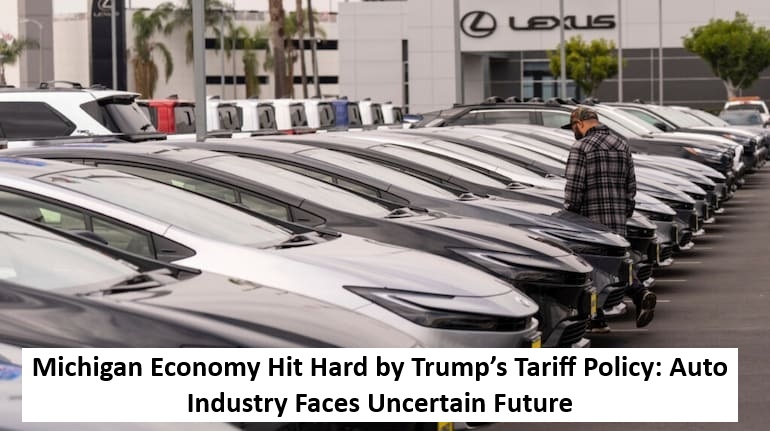
Michigan, where nearly 20% of the economy is tied to the auto sector, is now grappling with the fallout from President Trump’s global tariff strategy. With higher duties on imported car components from Canada, Mexico, and China, the state’s economic foundation is under pressure, according to the Wall Street Journal.
Major automakers in Detroit, including Stellantis, are responding swiftly. The company recently laid off 900 workers across Michigan and Indiana, citing disruptions from plant shutdowns in neighboring countries. Automakers are now stockpiling components and navigating cost hikes with suppliers.
Auto Suppliers Struggle to Cope with Surging Tariffs
Suppliers like Luxit and Lucerne International are facing sharp tariff hikes, notably on imports from China. Luxit CEO Stephane Vedie said the company is relocating some operations to Tennessee and possibly Michigan, although job growth will be minimal due to automation. Lucerne CEO Mary Buchzeiger echoed concerns, adding that the uncertainty is delaying plans for a new US factory.
Economic Forecasts Warn of Rising Costs and Job Losses
The Anderson Economic Group estimates vehicle prices could rise by $2,500 to $12,000, depending on the model.
University of Michigan economists expect the steel and aluminum tariffs alone to cost at least 600 jobs by next year.
Broader tariffs on auto imports could have even wider effects on design, research, and agriculture.
Business leaders are also warning of declining investment confidence and threats to public sector funding, including cybersecurity.
Public Voices: Concern Mixed with Hope
Local businesses are already feeling the impact. Detroit sandwich shop owner Leona Milton said job losses in the auto sector reduce consumer spending. However, some residents support the reshoring of production despite short-term challenges.
Mira Zeigler-Moore (Stellantis worker): Supports long-term benefits of reshoring.
Kelly Nering (finance professional): Believes sacrifices today protect future interests.
Auto Giants Race to Offset Financial Damage
GM is ramping up pre-tariff imports to reduce future costs.
Stellantis is speeding up production to stockpile parts.
Labour costs remain a major concern, with US factory workers earning far more than those in Mexico.
Ford dealer Jim Seavitt noted that trucks assembled with Canadian engines could see price hikes of 6–7%.
Detroit’s Revival Faces Major Test
Michigan has faced adversity before—international competition, the Great Recession, and municipal bankruptcy. But this latest challenge comes just as Detroit was regaining momentum through electric vehicle investments and the opening of Michigan Central as a tech hub.
Retail activity has declined significantly, and consumer confidence appears to be slipping. Even UAW President Shawn Fain admitted that transitioning under these conditions won’t be easy.
Read More: World Bank Approves 700 Million Dollars for Pakistan to Boost Economic Stability and Public Services

 Share
Share



